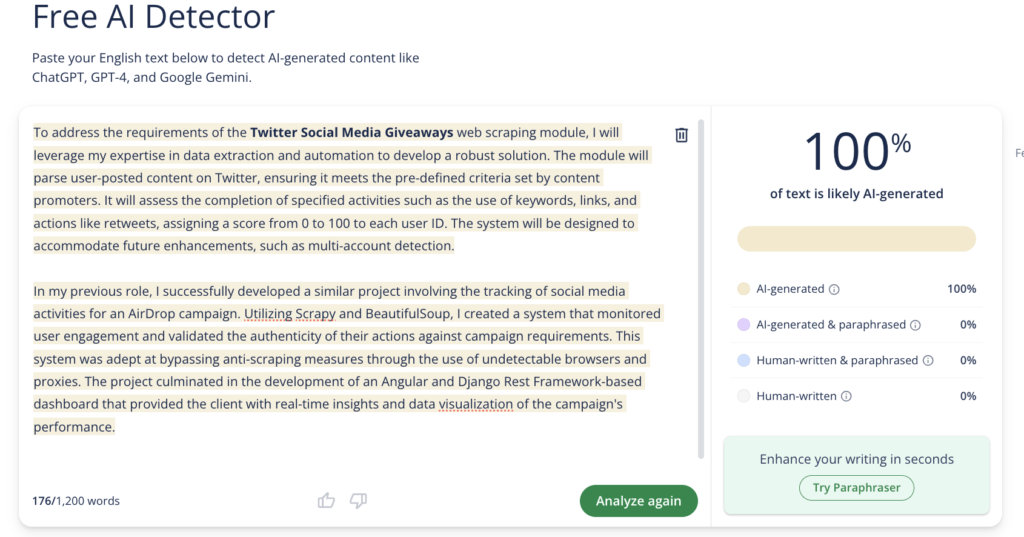In pursuit of the paid bids from service providers…. Is it possible that the largest freelance marketplace is just stimulating the development of chatbots to automate Upwork proposals as a part of “Upwork bidding strategy”? The funniest thing is, 25% of subsequent communication from our observation is still AI-driven, no agency operator involved 🙂
The funniest thing is, 25% of subsequent communication from our observation is still AI-driven, no agency operator involved 🙂
Coincidence, inability to resist, or conspiracy?
Did you know that Upwork charges subscriptions and contributions from service providers in order for their offers to reach the customer? So what could be easier, to use an additional tool that can replace the manager, adapt the offer to the customer’s request in such a way that it looks as unique as possible for the customer, the developer’s profile corresponds to his request 100%, the answer will come in minutes and is technically savvy? Will it increase Upwork success rate? Let’s dive into. AI models can not only do this, but have long been used to arm chatbots. Some Upwork proposal automation tools, such as https://gigrar.io, do this openly. Others use their own proprietary ai freelance bidding tools based on various AI models and neural networks, natural language processing with classification, and vector spaces. This ends up with Upwork AI assistant to work on your behalf, place bids and require more credits for next bids again. So what is hidden behind the scenes? Is support possible, or more – Upwork collusion with chatbot manufacturers? I will try to investigate this question further. The basics of any detective thinking say – look for a motive. The motive for Upwork is, of course, financial enrichment for service providers, which have no other option but to also join such races and deploy AI, otherwise they will lose in speed of responses and technical expertise for an uninformed customer. The AI developer is also benefiting because demand for their products and paid subscriptions is growing. Can Upfork stop using AI chatbots and introduce AI-generated content scans and detectors? The answer is of course yes. As of 2024, there are many AI detectors of generated texts of a wide variety, from ChatGPT 3.5 Turbo and Chat GPT 4.0 to various forks and private developments. The detectors even highlight parts of sentences and phrases typically generated by AI language models. But the problem is not in the text itself, in the generated AI, but in the fact that bots will create the illusion of an ideal proposal, an ideal developer that fits the project, which actually turns out to be the exact opposite. This is called Upwork AI proposal writing. Some freelancers do that manually, chasing effective bidding on upwork. Can this be considered misleading? Maybe so… Why haven’t the detectors been implemented yet, as of 2024? This question should be asked first and foremost to yourself, readers.Why do service providers use Upwork proposal automation?
Answers are different, but mostly to:- Increase Upwork proposal acceptance rate
- Upwork bid cost optimization (Upwork bid price suggestions tips)
- Follow best Upwork bidding techniques (pre-defined strategies and text sequences)
- Improve Upwork bid success by copying Upwork competition tips from other vendors and freelancers
Personal Experience
I tried to investigate the use of AI chatbots for upwork on the example of my question. To be honest, the impression is not very good. De Facto, from a client perspective – Upwork has degraded, in pursuit of paid bids from service providers. And that’s notable from recent Upwork Reviews. Ai in freelancing becomes more and more popula on Upwork every month.- Zero control over AI bots, or possibly encouraging. Upwork’s bread, after all.
- 85% bids are AI-generated. Scary…
May 2024, personal experiment: Python web scraping for social activity project. Bids speak for themselves: 85% of 1st cover letters were AI generated: 100%-90% AI texts, received within first 8 hours.A similar scenario canvas is traced for most AI-based bids, most end up with the following:
100% of AI-powered bidders ignored specific questions and replied with a standard MEETING LINK.
- Re-iterate job requirements, modify developer projects to match these requirements 1 to 1, and Polish with few tech terms that AI can easily add based on our tech stack description.
- Suggest a call.
 The funniest thing is, 25% of subsequent communication from our observation is still AI-driven, no agency operator involved 🙂
The funniest thing is, 25% of subsequent communication from our observation is still AI-driven, no agency operator involved 🙂Here is some retrospective observation
- 2015: 30%+ of Upwork developers never read & study project descriptions in depth.
- 2020: 40%+ of bids are placed by agencies (vs developers) & even less attention to specific project details. 50–100% price overhead on top of that.
- 2022-2023: Agencies start using AI bots like GigRadar.io to place bids (around ZERO attention to project details). Bidding cover letters become derivatives of the project description.
What’s next?
Will services provider AI bots talk to customer AI bots, hoping to submit winning bids on Upwork and discuss how real people will work on projects…?
Tags
Yaroslav Kuntsevych
co-CEO
Upstaff.com was launched addressing software service companies, startups and ISVs, increasingly varying and evolving needs for qualified software engineers
Explore more topics
Popular
Recent
Popular
Popular
Recent
Talk to Our Expert
Our journey starts with a 30-min discovery call to explore your project challenges, technical needs and team diversity.

Yaroslav Kuntsevych
co-CEO